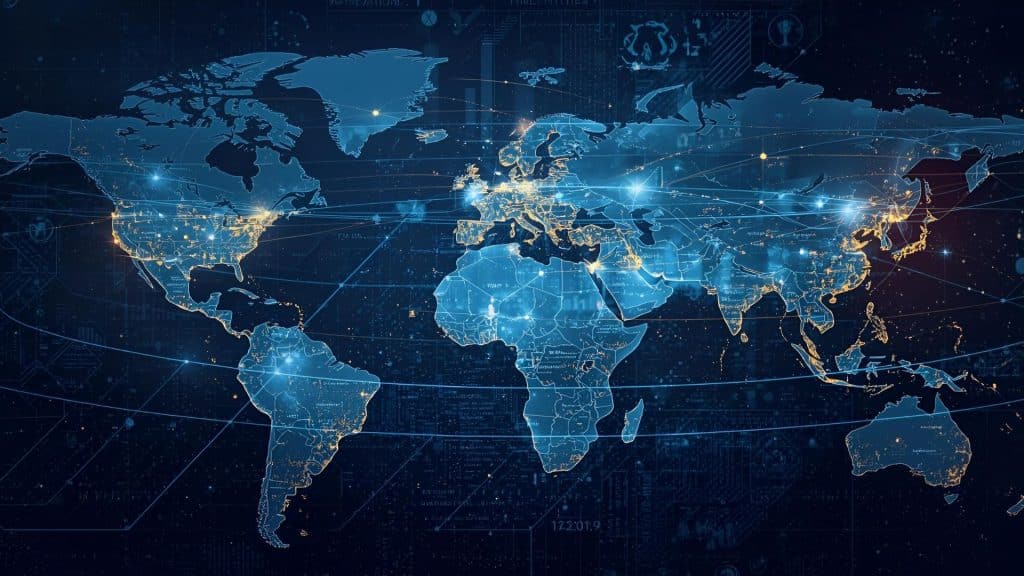Have you ever wondered why countries fight over computer chips and internet access, just as they once battled for oil and other valuable resources?
Technology has become the new battleground where nations compete for global influence and power.
From artificial intelligence to quantum computing, tech innovations now determine which countries lead the world stage.
The race for technological superiority affects everything from military strength to economic growth, making it a critical factor in modern international relations.
Countries that control key technologies gain significant advantages over their rivals, shaping diplomatic relationships worldwide.
In this blog, you’ll learn how technology geopolitics creates new forms of competition, what drives global power shifts, and how nations form strategic alliances to stay ahead in this high-stakes game.
What Drives Technology Geopolitics?
Nations compete in technology because digital innovations have become essential for economic growth, military power, and maintaining global influence in today’s interconnected world.
Governments view technological self-sufficiency as essential for strategic autonomy, aiming to secure vital resources and prevent competitors from gaining strategic leverage.
Nations pursue large-scale innovation strategies, funding cutting-edge programs, and limiting rivals’ opportunities to set the pace of global progress.
Technology leadership brings international prestige and global influence, enabling nations to establish worldwide standards, shape future policies, and influence key global technology development directions.
Key Technologies Shaping Global Power

Modern nations focus their competitive efforts on several key technological areas that directly impact their global influence and strategic capabilities.
Artificial Intelligence and Machine Learning
AI development has become a national priority because it affects military operations, economic productivity, and social control systems worldwide.
Countries that invest in AI research gain advantages in automation, data analysis, and decision-making processes, benefiting multiple sectors simultaneously.
Semiconductor Manufacturing
Computer chips power everything from smartphones to military equipment, making semiconductor production a critical national security and economic priority.
Nations controlling chip manufacturing can influence global supply chains and restrict access to essential technology components during conflicts.
5G and Communication Networks
Fast internet networks enable smart cities, autonomous vehicles, and real-time data sharing that boost economic growth and military capabilities.
Countries that build 5G infrastructure gain competitive advantages, while those dependent on foreign networks face potential security and economic risks.
Quantum Computing
Quantum technology promises to surpass current encryption methods and solve complex problems more efficiently than traditional computers can handle.
Nations leading quantum research could gain significant advantages in cybersecurity, financial markets, and scientific research in the coming decades.
Space Technology
Satellite systems control global communications, GPS navigation, weather monitoring, and military surveillance capabilities that have a direct impact on national security.
Countries with advanced space programs can project power globally while providing essential services that other nations depend upon daily.
How Does Technology Affect National Security?
Technology rivalries create new security challenges as nations worry about cyberattacks, data theft, and supply chain vulnerabilities.
Governments tighten security protocols by scrutinizing the origin of digital infrastructure, ensuring that networks and systems remain resilient against covert manipulation.
Military forces now rely heavily on advanced technology for weapons, communications, and intelligence gathering, making technological superiority a crucial factor in defense.
Governments create export controls and sanctions to prevent rivals from accessing sensitive technologies that could strengthen their military capabilities.
Did You Know: The United States has restricted Chinese companies from accessing American semiconductors and software to limit China’s technological advancement in critical areas.
Economic Impact of Technology Rivalries
Technology competition affects global trade patterns as countries prioritize domestic production and reduce dependence on foreign technology suppliers.
Nations invest billions in research and development programs to build domestic tech capabilities and reduce reliance on international partners.
| Economic Impact | Description | Global Effect |
|---|---|---|
| Trade Wars | Countries impose tariffs on tech products | Higher prices for consumers |
| Supply Chain Shifts | Companies move production to friendly nations | New manufacturing hubs emerge |
| Investment Blocks | Restrictions on foreign tech investments | Reduced global capital flows |
| Brain Drain | Countries compete for top tech talent | Uneven global innovation distribution |
These economic changes reshape global markets, forcing companies to choose sides in international technology competition battles.
Who Forms Strategic Tech Alliances?

Democratic nations often partner together to share the costs of technology development and coordinate responses to authoritarian competitors, such as China.
Military allies create joint research programs and share critical technologies to maintain collective security advantages over potential threats.
Key alliance partnerships include:
- United States, Japan, and South Korea in semiconductor manufacturing.
- European Union members in digital sovereignty initiatives.
- Five Eyes intelligence sharing between English-speaking nations.
- NATO countries cooperate in cybersecurity and space technology.
- Indo-Pacific partners in quantum research and AI development.
These partnerships enable smaller nations to access advanced technologies, while allowing major powers to distribute development costs and risks.
Future Challenges in Tech Competition
Technology rivalries will intensify as more countries recognize the strategic importance of controlling key innovations and supply chains.
- Cybersecurity Threats: Nations will face increasing risks of cyberattacks targeting critical infrastructure and sensitive government information systems.
- Supply Chain Fragility: Global technology supply chains are expected to become more fragmented as countries prioritize security over economic efficiency.
- Standards Competition: Different nations will promote competing technical standards, potentially creating incompatible global technology systems.
- Talent Competition: Countries will compete more aggressively for skilled engineers and researchers, leading to international brain drain issues.
- Regulatory Conflicts: Conflicting national regulations on data privacy and technology use will complicate international business operations and cooperation.
Wrapping It Up
In summary, technology geopolitics has fundamentally changed how nations approach international relations and strategic planning.
The shift from traditional resource-based competition to tech-focused rivalries creates both opportunities and risks for countries worldwide.
As we move forward, the balance between cooperation and competition will determine whether these advances benefit humanity or create deeper global divisions.
Nations must carefully manage their strategies to avoid conflicts while pursuing innovation goals.
The decisions made today about technology partnerships, trade policies, and research investments will shape the global landscape for generations to come.
Which technology rivalry do you think poses the greatest challenge to global stability, and how should world leaders address these concerns?
Share your perspective in the comments below.






































